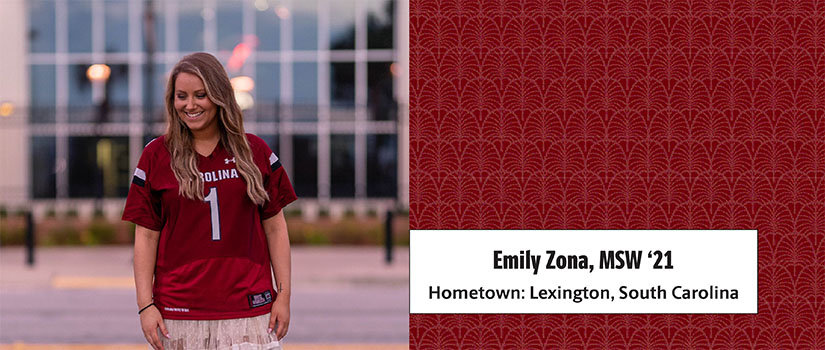Emily Zona had always been drawn to a helping profession. She began her undergraduate studies at the University of South Carolina as a nursing major. But the Lexington, South Carolina native admits she was not passionate about the field and chose nursing on a whim. While meeting with a major change advisor her freshman year, she found social work interesting and took an introductory class the following academic year. Her instructor sparked an interest in social work with personal stories and wrote one of Zona’s recommendations for the Master of Social Work program.
Zona will graduate with her MSW degree next week and begin her social work career at the South Carolina Youth Advocate Program psychiatric program. She is thankful that the college has helped cultivate her interest mental health, an area where she has gained more knowledge through courses and experiences to expand her passion.
I enjoy the medical side but eventually realized that I was more interested in the social aspects.
- Emily Zona
Were there any personal experiences that influenced your decision to change majors to social work?
“I’ve struggled with anxiety and depression throughout my life, and my uncle committed suicide just before I switched majors. Those personal experiences, along with my passion for mental health advocacy, influenced my decision.
My uncle’s suicide was a lot for me and my family to go through. But it continued to spark my interest to help even more people and make sure they didn't feel the way he did. I feel that I can better help others by having those personal experiences and knowing what it feels like.”
What are the most fulfilling and challenging aspects of working in mental health?
“The most fulfilling part is making a positive impact on others since I struggled with some of the same issues. Knowing that I can be someone who others trust, rely on, and express their thoughts to is a great feeling.
But that goes together with the challenges. Mental health can be a difficult topic to discuss. As a society, we are getting better with being more open, but the stigma remains. Finding the balance between doing what you can do to help and battling the stigma that comes with it is important.”
How has COVID-19 affected those dealing with mental health issues?
“COVID forced most people to spend time with themselves in their own environment, and there were not a lot of distractions where people could turn to. The virus and being in quarantine prevented interaction with others.
With mental health comes other issues, such as substance abuse, so I heard about incidents of relapse among individuals who suffered mental health issues. I think a lot of people suffered with the anxiety around COVID because there was not a sense of normalcy and all of the unknowns about the virus.”
Do you think there are misconceptions about mental health?
“From my own personal experiences, I was embarrassed to say that I was taking an anti-depressant or going to therapy. But as I've gotten older, I have become less ashamed and accepted the reality. This has helped me move forward in my own recovery.
People are now taking mental health more seriously, especially with suicides continuing to be one of the leading causes of death. Earlier generations grew up when mental health was dismissed or overlooked. While there are still stereotypes and negative assumptions with some of the more intense mental health disorders, there are more programs for people who are struggling.”
What are your future career plans?
“I took the LMSW exam in early April and passed. I recently accepted a full-time position in Columbia with the South Carolina Youth Advocate Program in their psychiatric program doing clinical case management work. My first day will be May 10.”
